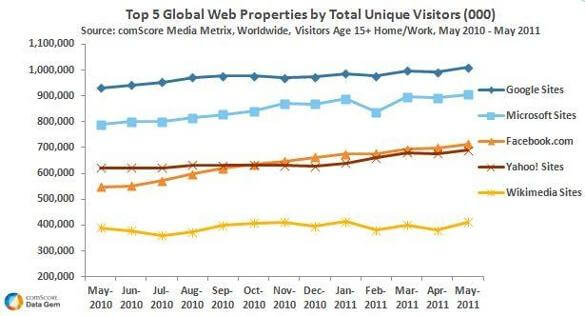Billions and Billions Served – Traffic In The New Era of Google and Facebook

Share
Google's online dominance can now be expressed in a new way: every month, the equivalent of one seventh of the world's population travels to their sites on the internet. Or maybe it's every week. ComScore, the web data-mining site, recently announced that a billion unique visitors went to Google in May 2011. That's a mind-blowing milestone, but Google seems to think they passed it long ago. In September of last year, VP Marissa Mayer said they were serving one billion users every week! Either way, we are talking about some massive traffic for the search engine giant, and they aren't alone. According to ComScore's estimates of monthly unique visitors, Microsoft has around 900 million, Facebook 700 million, and Yahoo about 690 million. Between them, these companies can reach and influence a huge portion of the online public which is now more than 2 billion people worldwide. As these sites continue to grow, how will the internet change with them?
Very quickly, I want to point out that while ComScore's numbers have made the bigger splash in the media recently, their statements aren't infallible. Far from it. These numbers are all estimates based on two million or so users (a big number, but a small fraction of the total overall), and 90 out of 100 of the largest web content publishers. However, Google itself doesn't contribute to ComScore's estimates, and we can't take these numbers as certain fact. Google released their own approximation of traffic back in September that sounds like they are reaching people at four times the rate that ComScore proposes. According to VP Marrissa Mayer, they've already passed "One Billion Users on Google's Sites Each Week" mark (see the video below, it's been cued up to the remark at Google Search 2010). Whether we put more stock in ComScore's "billion unique visitors per month" or Google's "billion users each week" doesn't matter as we can still draw the same conclusions about Google and its competitors: these sites are big, they're growing, and they represent the largest shared communications we have online. Actually, considering average TV, film, and radio audiences, these companies are among the most widespread forums for communication on the planet. Period.
It's unclear what these businesses are using that platform to say, however, besides simply asking us all to keep coming back to visit. While the business model for each of these companies is different, every one of these sites (or collection of associated sites, really) serves as a hub for communication. Search engines to point you to other web pages, social networks where you can share with friends, or just basic services like email, news feeds, etc. These aren't (by and large) the generators of content, they are the aggregators. But they are mighty. They make huge profits off of the ads that you see, and sometimes click on, while passing through their pages. In other words, these companies are operating tollbooths. Sure, we may not think of watching ads as paying a toll, but that's what they are. Mega-sites like Google and its competitors have built valuable expressways on the internet superhighway...and they're making their money back handsomely.
Which isn't to say that these companies aren't providing great services - I would weep if I had to go a day online without Google - it's simply important to remember how they make their profits. The top sites on the web live off of the scale of traffic itself, and they are transitioning us towards a sort of advertising based online economy. The real money isn't (exclusively) in selling, it's in helping other people sell. As Google, Microsoft, Yahoo, and Facebook grow, the importance of consumer-ad interaction is going to increase as well. In that kind of world, there's a premium to be placed on locking in users to their internet habits. A consumer that comes to the same site everyday, follows links often, and attracts other consumers with new content is a valuable asset. Internet users are becoming, if we aren't already, the most important commodity on the web.
Examining how each of the top traffic sites have grown in the past year highlights this new way of looking at consumers. Google is at the top, but only gained around 8% from last years numbers. Microsoft rose 15%, Yahoo 11%. The clear winner in growth is Facebook, which rose nearly 30% from May 2010 to May 2011, and nudged out Yahoo for the third place. Facebook is the epitome of the new consumer as commodity paradigm (which I'm very tempted to shorten to con-comm just to sound vaguely Orwellian). As users generate content they become more invested and attract other users in turn. The social network is viral in nature and addictive in habit. Facebook makes their money simply by selling things to us while we sell ourselves to each other.
Be Part of the Future
Sign up to receive top stories about groundbreaking technologies and visionary thinkers from SingularityHub.


Though maybe that's a morbid way to put it. Let's look at the bright side of things. Even if Google and the rest are operating tollbooths, the highways they've laid down are amazingly useful. I can find anything I need online in fractions of a second. I can find old friends I've lost and meet new ones quickly. I can communicate with people all over the world, and store/search those correspondences easily. I'm exposed to the ideas of thousands of people I've never met and I can share my own thoughts with many more. The internet would still be here if all four of these big hitters disappeared, but that doesn't mean it would be as good. Nor maybe as interconnected.
As we, the consumers, continue to build up these mega-sites we're effectively giving people all around the world a common ground. Two billion people online and counting, and most pass through these portals every month. Think of the possibilities to share information, to allow the world to have a nearly universal experience on a regular basis. Could these shared experiences help prevent wars? Probably not. But they are certainly expanding trade and the exchange of ideas. We're on the verge of some very powerful possibilities, perhaps even positive ones, as more and more of us walk down the same online roads everyday. What Google, Facebook, and the rest will do with these opportunities to speak to the world is unclear. Google may put up a fun variation of their logo, but they aren't exactly writing editorials on global political events. They don't really seem concerned with message building. The changes mega-sites may bring are likely to be through subtle influences rather than overt statements.
For better or worse, we have a large amount of influence in a small number of companies, and it looks like that trend will continue for the foreseeable future. I worry what it means to have an online economy centered on the consumer as commodity business model, and I know that the concentration of advertising revenue through a small number of hands is going to make proximity to those hands, not real merit, the best determinant of success for many smaller businesses. Singularity Hub is proud to be viewed by its readers (roughly) a million times every month, and we're definitely ecstatic by how quickly we've been growing these past few years. But for now, no site that relies on generating its own content can hope to compete with those that search, collect, and share the content of others. Maybe that's as it should be - I'm not sure. I just know that Google, Facebook and their ilk are leviathans the likes of which the world has never seen before. Hopefully they'll turn out to be more BFG than "fee-fi-fo-fum".
[image credit: ComScore DataMine]
Source: comscore
Related Articles

This Light-Powered AI Chip Is 100x Faster Than a Top Nvidia GPU

How Scientists Are Growing Computers From Human Brain Cells—and Why They Want to Keep Doing It

These Brain Implants Are Smaller Than Cells and Can Be Injected Into Veins
What we’re reading

